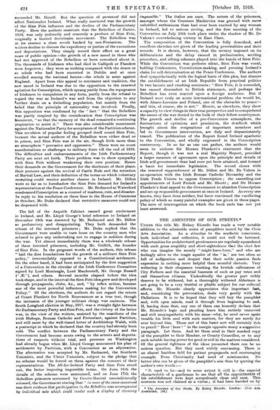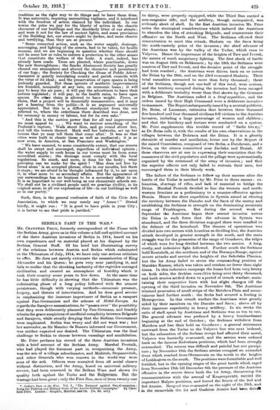THE AMENITIES OF OUR STREETS.*
UNDER this title Mr. Halsey Ricardo has made a very notable addition to the admirable series of pamphlets issued by the Civic Arts Association. As a stimulus to the aesthetic conscience, both individual and collective, it could not well be bettered. Opportunities for architectural graciousness are regularly squandered with such gross stupidity and short-sightedness that the elect few who can imagine the seemly " might-have-been," and who are feelingly alive to the tragic squalor of the " is," are too often so full of indignation and despair that their noble. passion finds expression in nothing more helpful than scornful rhetoric. Very withering is their eloquence touching the brutish callousness of City Fathers and the essential baseness of such as pay rates, and call themselves citizens. Undoubtedly the greater part richly deserve to be withered, but a thoroughly withered Alderman is not going to be a very fruitful or pliable subject for our cultesel efforts. Mr. Ricardo clearly appreciates this important feet, and, considering the provocation, deals very gently with the Philistines. It is to be hoped that they will buy the pamphlet and, with open minds, read it through from beginning to end. If, having done that, any one of them can honestly declare that Mr. Ricardo's logic and pleading leave him entirely unmoved and still unsympathetic with his aims—why, he need never again trouble his little soul with such matters, for they are surely for ever beyond him. Those not of this baser sort will certainly itch to pencil " Hear ! hear ! " in the margin opposite many a suggestive paragraph. Let them. And let them send in their marked copy of the pamphlet to their Member, or County Councillor, or to any such notable having power for good or evil in the matters considered. Of the general rightness of the ideas presented there can be no serious question. But they need widely canvassing. There is an almost limitless field for patient propaganda and encouraging example. Even Christianity had need of missionaries. No better idea can be given of the pamphlet's aim than by quoting the author's own words :--- " It used to be—and to some extant it still is—the especial characteristic of a gentleman to see that all the appointments of his establishment were kept scrupulously clean and neat. This neatness was not claimed as a virtue ; it had been handed on by • The Amenities of Our Streets. By Macey Maud°. London: Chic Arts Association. iOd.1
tradition as the right way to do things and to have them done. It was autocratic, requiring unremitting vigilance, and it interfered with the freedom of action claimed by the individual. In our towns the price we pay for the liberty of action is the chaotic character of our buildings and the disorderly litter of our streets ; and were it not for the law of ancient lights, and some provisions of the Building Act, our streets might be darker, and more chaotic and terrifying, than they are at present."
" Some concerted action, such as the water supply, drainage. scavenging, and lighting of the streets, had to be taken, for health reasons, and we are beginning to question whether there should not be some law or rules to enforce a protection to the other senses Vest constitute the welfare of the body. A start, indeed, has already been made. Trees are planted, where practicable, down the new thoroughfares ; the Smoke Abatement Society has greatly cleared our atmosphere and altered the character and persistency of our fogs ; the Society for Checking the Abuse of Public Adver- tisements is quietly inoculating county and parish councils with the virus of its ideal ; and the preservation of open spaces is being jealously guarded. But these sprouts of aesthetic improvements are founded, nominally at any rate, on economic bases ; it will pay to keep the air pure ; it will pay the advertisers to have their notices regulated ; it will pay, in the health rates, to have open spaces. No other claim is allowed to have weight. Prove, or claim, that a project will be financially remunerative, and it may get a hearing from the public—it is an argument universally appreciated. But this is a different standpoint from the one referred to, where the orderliness there described was done, not for economy in money or labour, but for its own sake."
" And this is the motive power that for all real improvement we must appeal to. . . . We want to recover something of the Psalmist's rapture, Walk about Sion, and go round about her, and tell the towers thereof. Mark well her bulwarks, set up her houses that ye may tell them that come after.' It was so that cities were built in classic times as well as mediaeval • it is so now even, in America, at San Francisco and Washington."
" We have ensured, to some considerable extent, that our streets shall be swept and scavenged, regardless of individual opinion ; the water supply to each house in our towns must be from some accredited source ; the drainage must comply with the local regulations. So much, and more, is done for the body ; what provision can we make for the spirit ? ' Man does not live by bread alone ' is an accepted phrase, often in our mouths, but there it we are afraid to be thought influenced by it, to act upon it, in wat seem to us secondary affairs. But the appearance of our surroundings has no business to be a secondary affair to us. It is as important to our well-being as our elementary schools are. We shall, not be a civilized people until we practise civility, in its original sense, in all our expressions of life—in our buildings as well as in our poetry."
Such, then, is the general confession of faith of the Civic Arts Association, to which we may surely say " Amen ! " Stated briefly, it might run : " It is good to have pride in your City ; it is better to see that pride is justified."



































 Previous page
Previous page